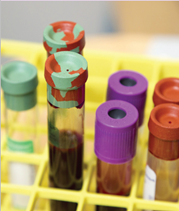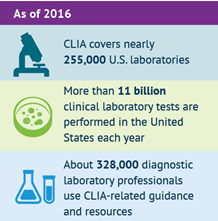Quality and Safety Systems
Through DLS’ work with other CDC programs, federal and state agencies, professional societies, and international organizations, the division supports the development and adoption of standards, guidelines, recommendations, and tools for improved quality and safety in clinical and public health laboratories. In collaboration with the Centers for Medicare and Medicare Services (CMS) and the U.S. Food and Drug Administration (FDA), DLS supports the Clinical Laboratory Improvement Amendments (CLIA) program, which governs all healthcare-related laboratory testing performed on people in the United States.

Our Services
- Collaborate with CMS, FDA, and other partners to develop regulatory standards and guidelines to implement and support CLIA regulations.
- Manage and support the Clinical Laboratory Improvement Advisory Committee (CLIAC), a federal advisory committee that provides independent scientific guidance on improving laboratory quality and safety practices.
- Conduct evidence-based systematic reviews using Laboratory Medicine Best Practices (LMBP) A-6 Method, and work with experts to develop best practice guidelines for various laboratory testing areas.
- Evaluate proficiency testing programs for CLIA compliance and provide expert recommendations for practical improvement.
- Assess cytology laboratory practices to assure quality of testing and practices.
- Enable and support collaborations with federal partners and other stakeholders for the exchange of information about laboratory practices.
- Monitor technological innovations and assess the effectiveness of laboratory practices and national regulations and voluntary guidelines.
- Support CDC CLIA-certified laboratories with the interpretation of the CLIA regulations and facilitate communications with CMS regarding CLIA related laboratory testing.

Our Impact
- Scientific input drives effective regulation. CLIAC has addressed issues that have faced the national laboratory and healthcare communities for more than 20 years. The committee’s insights have resulted in more than 100 formal recommendations and many changes to regulations, revisions in policy, development of educational materials, and studies to assess the impact of the CLIA program.
- DLS forges new collaborative efforts to help unite diverse fields and bring consensus on developing quality standards for emerging technologies. In 2012 and 2015, DLS led two national workgroups to develop consensus guidance for next generation sequencing. Prior to DLS’ involvement, there were no standards for how to use this new technology in clinical settings.
- DLS pioneers effective processes for developing systematic reviews and evidence-based recommendations. For example, the LMBPTM defined the A-6 Method—the only evidence-based process to systematically identify laboratory quality improvement practices.
- A Clinical Laboratory Integration into Healthcare Collaborative (CLIHC™) study identified gaps to develop solutions to optimize the effective use of laboratory services for better patient care.
- Between 2012 and 2016, DLS contributed to more than 30 published national or international standards and guidelines that address laboratory quality and safety needs. These include specific laboratory testing areas, such as cancer diagnostics, genetic testing, and microbiology testing,among others.

- Page last reviewed: August 11, 2017
- Page last updated: August 11, 2017
- Content source:


 ShareCompartir
ShareCompartir